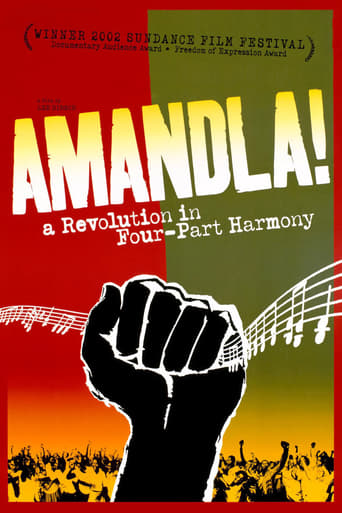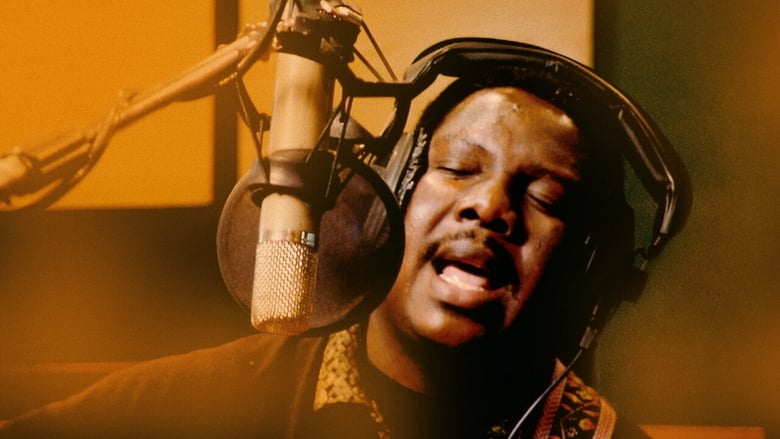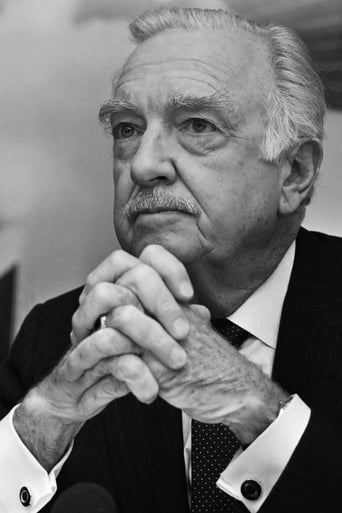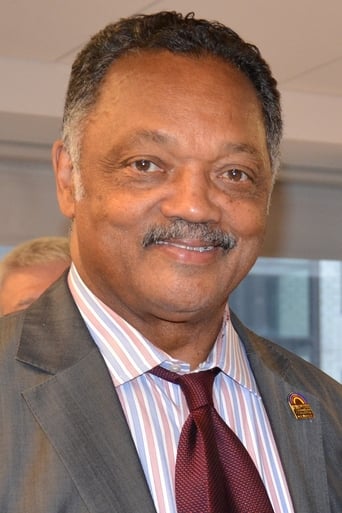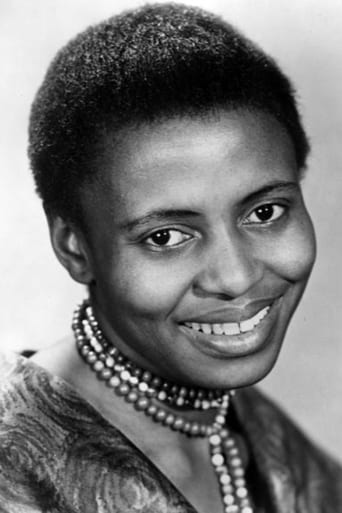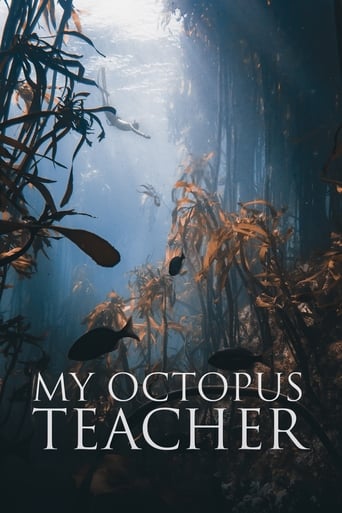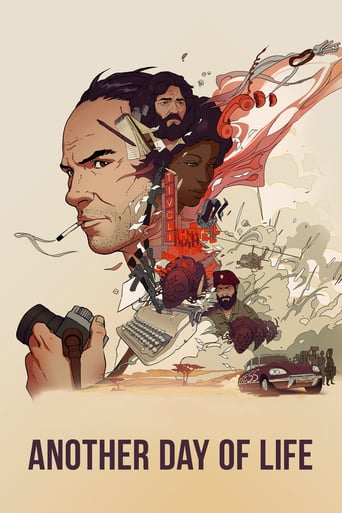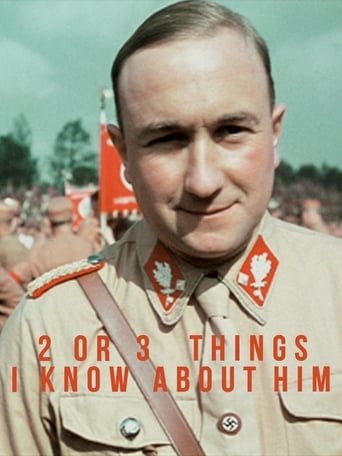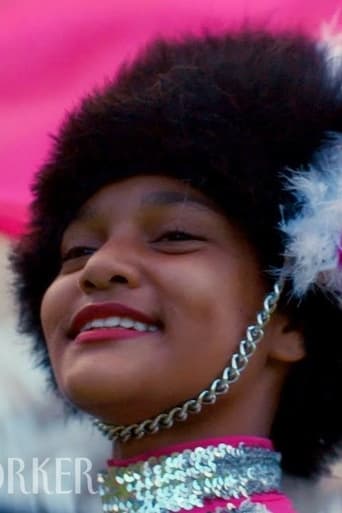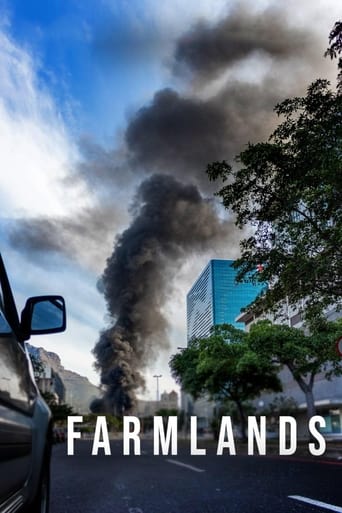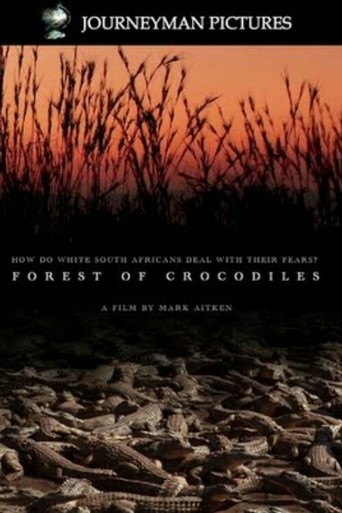Amandla! A Revolution in Four-Part Harmony (2002)
The struggle to eradicate apartheid in South Africa has been chronicled over time, but no one has addressed the vital role music plays in this challenge. This documentary by Lee Hirsch recounts a fascinating and little-known part of South Africa's political history through archival footage, interviews and, of course, several mesmerizing musical performances.
Watch Trailer
Cast


Similar titles
Reviews
The film makes a home in your brain and the only cure is to see it again.
The best films of this genre always show a path and provide a takeaway for being a better person.
This movie tries so hard to be funny, yet it falls flat every time. Just another example of recycled ideas repackaged with women in an attempt to appeal to a certain audience.
A terrific literary drama and character piece that shows how the process of creating art can be seen differently by those doing it and those looking at it from the outside.
I know this is a minority opinion, and I think if I was South African I would have been very moved by the film. But I just did not understand the issues well enough or know the history and weight of the people interviewed, except for Miriam Mekeba and Hugh Masekela. The film would have worked better for me if it had provided more background and focus for an uninformed American. It certainly never answered the first question I had: how can an entire nation sing so beautifully in four-part harmony? It must have seemed so normal to the filmmakers that they never even noticed that question. But for me, in a world where very few non-professional people know how to sing harmony, it's a stumper.
The definitive documentary for illustrating the struggle of the black South Africans,as told through the eyes of the White prison guards and executioners, black activists & Musicians. Some of the straight forward comments from the black activists, remain embellished in my mind."The train was Africa's first tragedy" (highlighting the need for the large corporates to mobilise the cheap black labour)& "We were treated like s*** and we still never smashed the place up"(showing how much they loved their country) The way in which the townships and their matchbox houses were quickly erected, and then demolished so that the black labour could be moved on to the next corporate project,effectively explains how black labour is no more than a dispensable and renewable chattel, a sort of nomadic feudalism destroying any sense of community. And finally the music which puts to shame the commercialised manufactured dross we hear on today's radio, masquerading as Jazz & Blues.The superb piece of music towards the end in the dark dingy club,where the female black singer with the haunting pitch delivers the names of those who died in the struggle,would moisten the eyes of the most hardened cynic.Could the world be in for an explosive treat of Black South African roots, jazz, rhythm and blues music? I hope so.
For almost fifty years from 1948 to 1994, black citizens in South Africa were stripped of every basic human right while governments of the world pretended not to see. Systematically uprooted from their homes and moved into "townships", they were made to carry passbooks, arrested without provocation, tortured and randomly murdered. But while successive governments took away their freedom, they couldn't take away their songs or their desire for freedom. Today, while there are still problems, Blacks and Whites live together in a free South Africa. Amandla: A Revolution in Four-Part Harmony, an incredibly moving documentary by Lee Hirsch, pays tribute to the role played by protest songs in the non-violent revolution that brought an end to apartheid nine years ago. Amandla means power, and it's the power of the songs that helped to free the people. Hirsch, a young filmmaker from New York, spent nine years in South Africa gathering newsreel footage, video clips, old photos, and interviews with musicians and political activists to show how protest songs expressed the fight against oppression. Winner of the Audience Award and the Freedom of Expression Award at the 2002 Sundance Film Festival, Amandla shows fifty years of South African history beginning with Prime Minister Verwoerd's announcing his racial segregation policy in 1948 describing it as "a policy of good-neighborliness." The film also shows footage of the Sharpeville massacre and the Soweto uprising, and the triumphant election of Nelson Mandela to the Presidency in 1994. Amandla begins with the exhumation from a pauper's grave of composer Vuyisile Mini whose protest anthems led to his hanging in 1964 and ends with his proper reburial fifty years later. It moves forward to depict how the songs communicated to the people in a way that political speeches could not, showing how different phases of the struggle brought forth different types of songs. For decades, songs such as Mini's "Beware Verwoerd", Vilakazi's "Meadowlands", the "Toyi-Toyi" chant and the uplifting "Mandela" by Hugh Masekela expressed the energy and purpose of the South African people and rallied followers to their cause. In addition to the music, there are interviews with those that describe their experience of being imprisoned or were forced into exile. There are even interviews with White riot policeman and executioners, but the power of the film belongs to the music and powerful is an understatement. It is truly moving to watch 20,000 people sing in unison a song that has only one word Senzenina asking, "What have we done?" over and over, "What have we done?" It is worth the price of admission just to hear Sophie Mgcina singing Madam Please, a song written for black domestic workers that includes the lines " Madam, please, before you ask me if your children are fine/ Ask me when I lost all mine". Amandla builds to a joyous climax with President Nelson Mandela singing Masekela's "Bring Him Back Home" before thousands of cheering admirers. It has been only nine years since freedom came to South Africa but many have only a distant memory of the years of oppression and conflict. Similar to movies about the holocaust, Amandla underscores the power of films to help us remember. Though it could be a little shorter or perhaps a little more focused, if you see one film this year, make it Amandla: A Revolution in Four Part Harmony. At the end, you may be short of Kleenex but filled with renewed hope for the human race.
Amandla! is one of the first documentaries about the fight against apartheid in South Africa. More importantly, it tells the story in a way that is inspirational, funny, factual and humanizes the struggle.The film was the most decorated film at Sundance 2002, where it won the Audience Award for Documentaries and the Freedom of Expression Award.I have seen it many times. Each time I try to hide the tears that well up in my eyes and control the pride I feel for knowing the people of South Africa. It is difficult to capture the warmth and dignity of the African people in the face of poverty and oppression but Amandla! succeeds.Don't let your preconceptions of Africa last a day longer - go see this film and see the world is a little larger than you thought.

